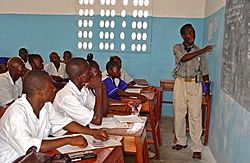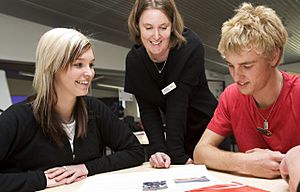Teacher facts for kids

A teacher in a classroom at a secondary school in Pendembu, Sierra Leone.
|
|
| Occupation | |
|---|---|
| Names | Teacher, educator, schoolteacher |
|
Occupation type
|
Profession |
|
Activity sectors
|
Education |
| Description | |
| Competencies | Pedagogy, subject knowledge; competence in teaching the subject, in curriculum, in learner assessment; psychology; planning; leadership. |
|
Education required
|
(varies by country) Teaching certification |
|
Fields of
employment |
Schools |
|
Related jobs
|
Professor, academic, lecturer, tutor |
A teacher (also called a schoolteacher or formally, an educator) is a person who helps students to acquire knowledge, competence or virtue.
Informally the role of teacher may be taken on by anyone (e.g. when showing a colleague how to perform a specific task). In some countries, teaching young people of school age may be carried out in an informal setting, such as within the family (homeschooling), rather than in a formal setting such as a school or college. Some other professions may involve a significant amount of teaching (e.g. youth worker, pastor).
In most countries, formal teaching of students is usually carried out by paid professional teachers. This article focuses on those who are employed, as their main role, to teach others in a formal education context, such as at a school or other place of initial formal education or training.
Contents
Duties and functions
A teacher's role may vary among cultures.
Teachers may provide instruction in literacy and numeracy, craftsmanship or vocational training, the arts, religion, civics, community roles, or life skills.
Formal teaching tasks include preparing lessons according to agreed curricula, giving lessons, and assessing pupil progress.
A teacher's professional duties may extend beyond formal teaching. Outside of the classroom teachers may accompany students on field trips, supervise study halls, help with the organization of school functions, and serve as supervisors for extracurricular activities. In some education systems, teachers may be responsible for student discipline.
Competences and qualities required by teachers
Teaching is a highly complex activity. This is partially because teaching is a social practice, that takes place in a specific context (time, place, culture, socio-political-economic situation etc.) and therefore is shaped by the values of that specific context. Factors that influence what is expected (or required) of teachers include history and tradition, social views about the purpose of education, accepted theories about learning, etc.
Competences
The competences required by a teacher are affected by the different ways in which the role is understood around the world. Broadly, there seem to be four models:
- the teacher as manager of instruction;
- the teacher as caring person;
- the teacher as expert learner; and
- the teacher as cultural and civic person.
The Organisation for Economic Co-operation and Development has argued that it is necessary to develop a shared definition of the skills and knowledge required by teachers, in order to guide teachers' career-long education and professional development. Some evidence-based international discussions have tried to reach such a common understanding. For example, the European Union has identified three broad areas of competences that teachers require:
- Working with others
- Working with knowledge, technology and information, and
- Working in and with society.
Scholarly consensus is emerging that what is required of teachers can be grouped under three headings:
- knowledge (such as: the subject matter itself and knowledge about how to teach it, curricular knowledge, knowledge about the educational sciences, psychology, assessment etc.)
- craft skills (such as lesson planning, using teaching technologies, managing students and groups, monitoring and assessing learning etc.) and
- dispositions (such as essential values and attitudes, beliefs and commitment).
Qualities
Enthusiasm
It has been found that teachers who showed enthusiasm towards the course materials and students can create a positive learning experience. These teachers do not teach by rote but attempt to invigorate their teaching of the course materials everyday. Teachers who cover the same curriculum repeatedly may find it challenging to maintain their enthusiasm, lest their boredom with the content bore their students in turn. Enthusiastic teachers are rated higher by their students than teachers who didn't show much enthusiasm for the course materials.

Teachers that exhibit enthusiasm are more likely to have engaged, interested and energetic students who are curious about learning the subject matter. Recent research has found a correlation between teacher enthusiasm and students' intrinsic motivation to learn and vitality in the classroom. Controlled, experimental studies exploring intrinsic motivation of college students has shown that nonverbal expressions of enthusiasm, such as demonstrative gesturing, dramatic movements which are varied, and emotional facial expressions, result in college students reporting higher levels of intrinsic motivation to learn. But even while a teacher's enthusiasm has been shown to improve motivation and increase task engagement, it does not necessarily improve learning outcomes or memory for the material.
There are various mechanisms by which teacher enthusiasm may facilitate higher levels of intrinsic motivation. Teacher enthusiasm may contribute to a classroom atmosphere of energy and enthusiasm which feeds student interest and excitement in learning the subject matter. Enthusiastic teachers may also lead to students becoming more self-determined in their own learning process. The concept of mere exposure indicates that the teacher's enthusiasm may contribute to the student's expectations about intrinsic motivation in the context of learning. Also, enthusiasm may act as a "motivational embellishment", increasing a student's interest by the variety, novelty, and surprise of the enthusiastic teacher's presentation of the material. Finally, the concept of emotional contagion may also apply: students may become more intrinsically motivated by catching onto the enthusiasm and energy of the teacher.
Interaction with learners
Research shows that student motivation and attitudes towards school are closely linked to student-teacher relationships. Enthusiastic teachers are particularly good at creating beneficial relations with their students. Their ability to create effective learning environments that foster student achievement depends on the kind of relationship they build with their students. Useful teacher-to-student interactions are crucial in linking academic success with personal achievement. Here, personal success is a student's internal goal of improving themselves, whereas academic success includes the goals they receive from their superior. A teacher must guide their student in aligning their personal goals with their academic goals. Students who receive this positive influence show stronger self-confidence and greater personal and academic success than those without these teacher interactions.
Students are likely to build stronger relations with teachers who are friendly and supportive and will show more interest in courses taught by these teachers. Teachers that spend more time interacting and working directly with students are perceived as supportive and effective teachers. Effective teachers have been shown to invite student participation and decision making, allow humor into their classroom, and demonstrate a willingness to play.
Teaching qualifications
In many countries, a person who wishes to become a teacher must first obtain specified professional qualifications or credentials from a university or college. These professional qualifications may include the study of pedagogy, the science of teaching. Teachers, like other professionals, may have to, or choose to, continue their education after they qualify, a process known as continuing professional development.
The issue of teacher qualifications is linked to the status of the profession. In some societies, teachers enjoy a status on a par with physicians, lawyers, engineers, and accountants, in others, the status of the profession is low. In the twentieth century, many intelligent women were unable to get jobs in corporations or governments so many chose teaching as a default profession. As women become more welcomed into corporations and governments today, it may be more difficult to attract qualified teachers in the future.
Teachers are often required to undergo a course of initial education at a College of Education to ensure that they possess the necessary knowledge, competences and adhere to relevant codes of ethics.
There are a variety of bodies designed to instill, preserve and update the knowledge and professional standing of teachers. Around the world many teachers' colleges exist; they may be controlled by government or by the teaching profession itself.
They are generally established to serve and protect the public interest through certifying, governing, quality controlling, and enforcing standards of practice for the teaching profession.
Related pages
Images for kids
-
The teacher-student-monument in Rostock, Germany, honors teachers
See also
 In Spanish: Profesor para niños
In Spanish: Profesor para niños






